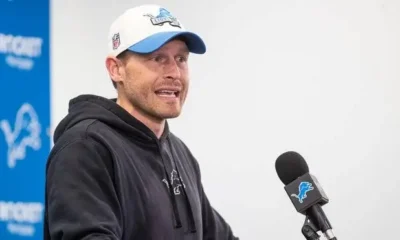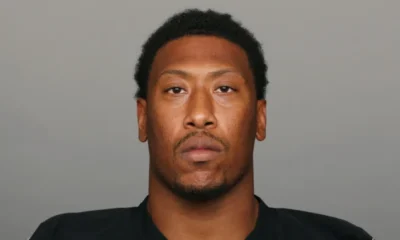Blog
Flagg isn’t like most young stars, though he…
DURHAM, N.C. – Finding the number that best shows how valuable Cooper Flagg is to the Duke Blue Devils is one of the hardest parts of explaining what makes him such an amazing basketball player. Another reason could be that the most useful number is the most dull one: minutes played.
He was off the court for only 2 minutes and 27 seconds of the 84–78 win over No. 2 Auburn on Wednesday. It was a close game last week against No. 1 Kansas, but he played all 38 minutes. He also played all 38 minutes in a home win against Arizona. Flagg is in a game if Duke is in it.
In a basketball sense, there’s no reason to ever take him out. Of course, everyone could use some rest, but Duke coach Jon Scheyer knows that Flagg helps the Blue Devils in so many ways that he can fix anything that isn’t working right now.
That’s what makes this rookie so great, no matter how hard people try to make it about his age. A few days before Christmas, he will turn 18. Not even when he’s “only 17” will it be hard to believe how many skills Flagg has built up.
“It’s his strength.” I mean, every team is looking for Cooper. “They want to take him off his game,” Tyrese Proctor, a junior guard at Duke, told The Sporting News. “Everyone thinks he’s always trying to score, but he’s such a great helper.” His coming back. He is fighting over every property. It’s crazy how calm he is for being so young. I see it all the time since I’m with him every day.
Flagg is averaging 16.6 points per game after eight games, four of which were against big teams. He fell to the floor twice while trying to create a game-winning chance against those well-known teams, first when Duke lost to Kentucky and then when they lost to Kansas.
He had made only 2 of 8 shots from the floor and scored only 6 points after 20 minutes.
One might ask, “What’s the big deal?”
From that point of view, Flagg is either an annoying or interesting player. He wants you to look more closely at his game, or at least look past the score column on a simple box score.
“He never fights you so you can coach him.” You can beat him in a game. Scheyer said, “He always wants to get better in practice and in every part of his game.” “Coops has always seemed like a one-time thing to me.” He needs to go through something once to get used to it.
“I really thought it was big to see the growth in big moments and be able to make shots against high-level defenders in such a short amount of time, whether it was a month or something else.”
Look at Flagg’s rebounds. He had already gotten 10 balls off the boards, 8 of them on defense, by halftime against Auburn, giving the Tigers only three chances to score on second chances. Flagg clearly has the Paul Silas skill of being able to read a shot in the air and figure out which way it will go if it doesn’t hit. And he’s got that Dennis Rodman thing where he’s fast enough to get there as the ball starts to fall.
Then there are the helps. He stole the ball from Chad Baker-Mazara, drove it into the break, and floated it over a defender just past midcourt to hit guard Caleb Foster in stride with 1:37 left in the first half. That was one of the four he made in the game. Foster took this perfectly put pass, calmed down, and made a 3-pointer to make the score 40-36 in favor of Duke. The fastbreak game saw Duke beat Auburn by a score of 16–0. Flagg’s ability to grab loose balls and drive them into transition is a big part of that.
Blocks are also fun, and he turned away two Auburn players. With 13 minutes left, he hit Denver Jones with the full length of his horizontal reach after jumping in the air to block his path.
“I think it came from how much my parents pushed me to play the right way and do everything I could to help my team win,” Flagg told TSN. “That includes playing defense, getting the ball back, passing to the open man, and just trying to make the right play every time.”
“One of the most important things for me was playing games way ahead of my age when I was young and getting live game experience from a very young age.” I played on an AAU team for fifth graders when I was in the second grade. It wasn’t something my body was ready for, but those kinds of things made me so ready for the next level and to keep going forward. People are going to be rough with me, so I need to be ready for that from a young age.
Even though he does a lot of things, he is not perfect. Flagg has had to learn that it is harder to handle the ball against a college team because their players are faster, bigger, more experienced, and smarter. Scheyer told TSN, “We put enough pressure on him in the 37 minutes” of this game, so there wasn’t as much pressure on him to start the attack in the last few minutes.
“I feel like I’m going from high school to college…” “There are always people to fill in the gaps,” Flagg said. “Your dribbles, moves, and everything you do to try to get to the basket or make a jump shot have to be very effective.” For me, that comes back to the mistakes.
Flagg had nothing in this game.
Bruce Pearl, the coach at Auburn, said, “We didn’t bother him enough.” “He lived at the foul line.” “He’s a great player; he gets a great whistle.”
If you like being amazed by huge point totals, Flagg might sometimes thrill you. He got 24 points in a blowout win over Arizona and 26 points in that loss to Kentucky. He scored 22 points in the end. Early in the second half, he put the score and Duke’s lead over 10 by hitting the middle for a beautiful fadeaway and then driving right past Chaney Johnson of the Tigers with 17:30 left.
He will never be Kevin Durant, though.
It’s like the difference between a great action movie like “Die Hard” and a great movie in a foreign language like “The 400 Blows” by Flaubert. In their own ways, both are exciting, but one will make you work harder to see how brilliant it is.
Hey Mike DeCourcy

Since 1995, Mike DeCourcy has written a piece for The Sporting News about college basketball. He began writing about basketball in newspapers in Pittsburgh, Memphis, and Cincinnati. Over the course of 37 years, he has added 34 Final Fours to his resume. He works as a live analyst for the Big Ten Network and an NCAA Tournament Bracket reporter for Fox Sports. He is also a member of the United States Basketball Writers Hall of Fame. He also writes a lot about soccer and the NFL for TSN. In the decade known as “The City of Champions,” Mike was born and raised in Pittsburgh. He also graduated from Point Park University there.
Made since 1886 for fans
-

 Blog2 months ago
Blog2 months agoJOHNSON BREAKS SILENCE: Ben Johnson, the offensive coordinator for the Lions, makes news when he renders a decision on the Saints’ alluring coaching offer of $45.2 million…
-

 Blog1 month ago
Blog1 month agoBREAKING NEWS: Detroit Lions Offensive Coordinator Ben Johnson Breaks His Silence, And Makes News Following His Decision On The Saints’ Alluring Coaching Offer Of $45.2 million….
-

 Blog1 month ago
Blog1 month agoBREAKING NEWS: Lions’ offensive coordinator Ben Johnson will remain in Detroit, as he informed the clubs that he will continue with the Lions and wants another chance at delivering the Lombardi Trophy to Detroit
-

 Blog2 months ago
Blog2 months agoJOHNSON BREAKS SILENCE: Ben Johnson, the offensive coordinator for the Lions, makes news when he renders a decision on the Saints’ alluring coaching offer of $45.2 million…
-

 Blog2 months ago
Blog2 months agoJOHNSON BREAKS SILENCE: The Lions’ offensive coordinator, Ben Johnson, creates headlines when he decides on the Saints’ attractive coaching offer of $45.2 million
-

 Blog2 months ago
Blog2 months agoLatest NFL news: Bruce Irvin, a former Detroit Lions defensive lineman, wrote a passionate statement to the team’s owner, Sheila Ford Hamp, in which he stated that…
-

 Blog1 month ago
Blog1 month agoBen Johnson will remain in Detroit, having notified the clubs that he would continue with the Lions and wants another chance to carry the Lombardi Trophy to Detroit…
-

 Blog4 weeks ago
Blog4 weeks agoBen Johnson is the NFL’s most sought-after head coaching prospect. One team is his ideal fit and offers him $212 million…
